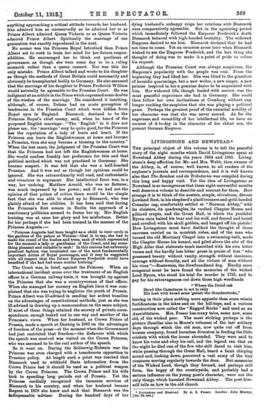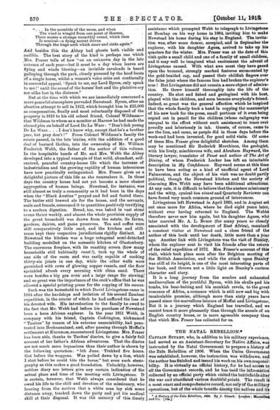LIVINGSTONE AND NEWSTEAD.*
THE principal object of this volume is to tell the peaceful story of the eight months which David Livingstone spent at Newstead Abbey during the years 1864 and 1865. Living- stone's deep affection for Mr. and Mrs. Webb, then owners of the Abbey, is, of course, well known to all readers of the explorer's journals and correspondence, and it is well known also that The Zambesi and its Tributaries was compiled during this long and happy visit. Yet the idea of Livingstone at Newstead is so incongruous that these eight uneventful months well deserve a volume to describe and account for them. How strange it is to think of the austere, simple, chivalrous, devout Lowland Scot, in his shepherd's plaid trousers and gold-banded Consular cap, comfortably settled at " Norman Abbey," with its cloisters, its quadrangles, its vaulted Chapter House and pillared crypts, and the Great Hall, in which the youthful Byron once baited his hear and his wolf, and fenced and boxed and revelled with his skull goblets, and banged off his pistols ! How Livingstone must have disliked the thought of those carouses carried on in monkish robes, and of the man who turned the old Mortuary Chapel into a swimming-bath, made the Chapter House his kennel, and piled above the site of the High Altar that elaborate tomb inscribed with his own bitter verses and the hardly less bitter prose in praise of him " who possessed beauty without vanity, strength without insolence, courage without ferocity, and all the virtues of man without his vices "—Boatswain, the Newfoundland dog. Hardly more congenial must he have found the memories of the wicked Lord Byron, who stood his trial for murder in 1765, and to pay for his extravagances cut down those high woodlands
" Where the Druid oak Stood like Caractacus in act to rally His host with broad arms 'gainst the thunderstroke," leaving in their place nothing more apposite than some mimic fortifications in the lakes and on the hill-tops, and a curious construction now called the "Ragged Rocks " and used as an Aussichtsturm. Mrs. Fraser has many tales, some new, some old, of the wicked peer. The most striking perhaps is the picture (familiar also in Moore's volumes) of the last solitary days through which the old man, now quite cut off from human company, found harmless diversion in feeding the little crickets with which the house abounded. They were said to know his voice and obey bie call, and the legend ran that on the night he died one of the few who still dared to visit him, while passing through the Great Hall, heard a faint chirping sound and, looking down, perceived a vast army of the tiny creatures moving regularly towards the door. But memories of the Wicked Lord, though they formed, and perhaps still form, the bogey of the countryside, and probably had a serious influence on the young poet's character, were not the only things which haunted Newstead Abbey. The poet him- self tells us how in the old church
• Litingeona and News! cad. By A. Z. Fraser, London : John Murray, [10s. 6d. net.] . . In the noontide of the moon, and when • The wind is winged from one point of Heaven, . There moans a strange unearthly sound, which then Is musical—a dying accent driven Through the huge arch which soars and sinks again."• Arid besides this the Abbey had ghosts both visible and . . audible. • The best story of the kind is perhaps one which Mrs. Fraser tells of bow "on an unknown .day in the late aututun of each year—but it must be a day when leaves are flying and winds blowing—an invisible cavalcade is heard galloping through the park, clOsely pursued by the hbof-beats of a single horse, whilst a woman's voice cries out continually in sOrrowftil appeal, ' Speak to me, my LOrd Byron, only speak to me 1' until the sound of the bonsai' feet and the plaintive cry are alike lost in the distance."
But at the time with which we are immediately concerned a more peaceful atmosphere pervaded NeWstead.. Byron, after an abortive attempt to sell in 1812, which brought him in 225,000 as compensation, finally and most reluctantly disposed of the property in 1818 to his old school friend, Colonel Wildnien- that Wildman to whom as a monitor at Harrow he had made the absurd plea on behalf of Lord De La Warr : Don't lick young De La Warr.. . . I don't know why, except that he'sn. brother peer, but pray don't !" From Colonel Wildman's family the estate passed, in the late 'sixties, with the addition of a good deal of bastard Gothic, into the ownership of Mr. William Frederick Webb, the father of the author of this volume. In the hospitable hands of Mr. and Mrs. Webb the Abbey developed into a typical example -Of that solid, abundant, self- centred, peaceful country-house life which the increase of industrialism and the growing rapidity of htiman intercourse have now practically extinguished. Mira Fraser gives us a delightful picture of this life as she renienibers it. In those days the country house bad. not yet become a mere chence aggregation of human beings. NeWstead, for instance, was still almost as truly a community as it bad been in the days *hen the " Black Austins " prayed and fed and fasted there. The baler still brewed ale for the . house, and the servants; male and female; consumed it in quantities positively terrifying m to a odern digestion.- Bread, too, was baked in vast stand ovens thrice weekly, and almost the whole proVisithi supply of the great household was drawn froin the estate; its Wins, gardens, dairies, and game preserves. Tea and coffee Were still comparatively little used, and the kitchen and room kept their respective juriedictions rigidly distinct. At Newetead the kitchen ivas. a huge octagonal seiril-delliehed building modelled on the monastic kitchen of Glastonbury. The enormous fireplace, with its roasting screen .(hOW Many households still habitually roast ?), took tip the whole of one aide of the room and Was easily capable of cooking thirty-six joints in one day, -While the ' other- walls were garnished with rows of glowing Copper vessels, and the godic sprinkled afresh every morning with Olean sand. There were besides a big gas oven and a large range flir stewing: and so great was the importance of the cook's office that he was allowed a Special printing press' for the copying of his nientW Such was the hodsehold to which David Livingstone came in 1864 after the hardships and isolation Of his second Zambesi expedition, in the course of which he had suffered the toss of his devoted wife.- Etis introduction to the Utility he Owed to the fact that Mri Webb had- before his purchase of NeWstead been a keen African explorer. In the year 1851 Webb, in company with his friend, Captain Codrington, hicknained Tacitus" by reason of hie extreine Unsociability, had pene- trated into Bechnerialand, and; after passing through Moffat's settlement at Knruman, encountered Livingstone: MrS. Fraser has been able, thanks to Tacitine diaries, to give a fairly full account of her fathers African adventures. That the diaries are not much more loquacious than theivanthor is shown by the following -quotation.: "5th June. Trekked five hicittiv. Got before the waggons. Was pulled down .by a lion, Which I abet before he could bite the horse," but evert such etenO- graphy as this makes a good foundation. Unluckily, howeVer, neither diary nor letteris give any Certain indication Of the actual place and time of the meeting- with Liiingitone. It is certain; :however, that Webb alwaye considered that he owed his life to the skill arid devotion of the micitienary, who hearing from the natives that a white man ley sick some diatandis away, tracked down the party and put his medical Skill at their diepOsal. was the memory "Or tole timely,. Assistance which prompted Webb to telegraPh to Livingitore at Bombay on his way home in 1864, inviting him to make Newatead his home during his stay in England. The invita- tion was, after some demurs accepted, and in September the explorer, with his daughter Agnes, arrived to take up his quarters for the winter. Mra Fraser was at the date of this visit quite a small child and one of a family of small children, and it may well be imagined What excitement the advent of Livingstone caused. With what awe must they have gazed unon the bronzed, strongly marked featUres Ourmounted by the gold-braided cep, and passed their childish fingers over the false joint where the famous lion had broken the explorer'S arm.! But Livingstone did not remain a mere object of atltniris4 tion. He threw himself thoroughly into the life of the country. He shOt and fished and geologized with his hest, played with the Children, and soon became everybody's friend: Indeed, so great was the general affection which he inspired that the whole family took a hand in copying the manuscript Of his new book for the press, small portione of it even being copied out in pentil for the children (whose caligraphy was unequal to the effort without such assistance) to trace over Proudly and laborionslY in ink. Guests, of Course, ottShie to see the lion, and came, as peOple did in those' days befere the week-end had been invented, for good solid visits. Of some Of these Mrs. Fraser gives delightful sketches. Ainong the& may be mentioned Sir Roderick Murchison, the geologist, With his lively, mischievous Wife, and Abraham Hayward, the literary lawyer, translator of Faust and author Of Thia'Art of Dining, of whom Frederick Locker hitt, left an inimitable description in My Confidences. Hayward Seems at this time to have been acting as a kind of unofficial agent of Lord Palmerston, and the object of his visit was no doubt partly, politiCal, though the Newstead kitchen and the society Of charming Mrs. Webb may have been additional attradkittik At any rate, it is difficult to believe that the austere missionary and the witty, cynietil bon vivant and Quarterly Reirie*er can hive found very much common ground of intercourse. Livingstone left Newste•ad in April 1865, and in August AA Mit once more for Africa, where he died eight years lateri without eVer, • having returned to England. The Webb therefore never saw him again, but his daughter Agnes, wlio later married Mr. A, Ix Bruce (for many years so .Closeli associated With the deVelaninent of East Africa), remained a constant visitor at Newstead and a Close friend of the author of this book until her death, little more than a year ago: Another link with Liiingstone was the visit of Stanley, *hone the explorer sent to visit his fiiends after the return of the relief expedition of 1872. Mrs. Fraser's account of thit visit, which took place soon after the Brighton meeting of the British Atisociation, and while the attack upon Stanley Was still at its height, is one of the most interesting parts of her book, and throws not a little light on Stanley's curious cheracter and story. • . , It is a long journey from the sombre and exhausted mediaevalisizi of the youthful Byron, with his skulls and his tombs, his bear-baiting and his monkish revels, to the great romance of Africa, a romance which is still new and big with incalculable promise, althOugh more than sixty years have passed since the marvellous labours of Moffat and Livingstone, But it is a journey, which England has travelled, and we cannot trace it more pleasantly than through the annals of an English country house, or in more agreeable company than that which Mre. Fraser has collected for us.















































 Previous page
Previous page